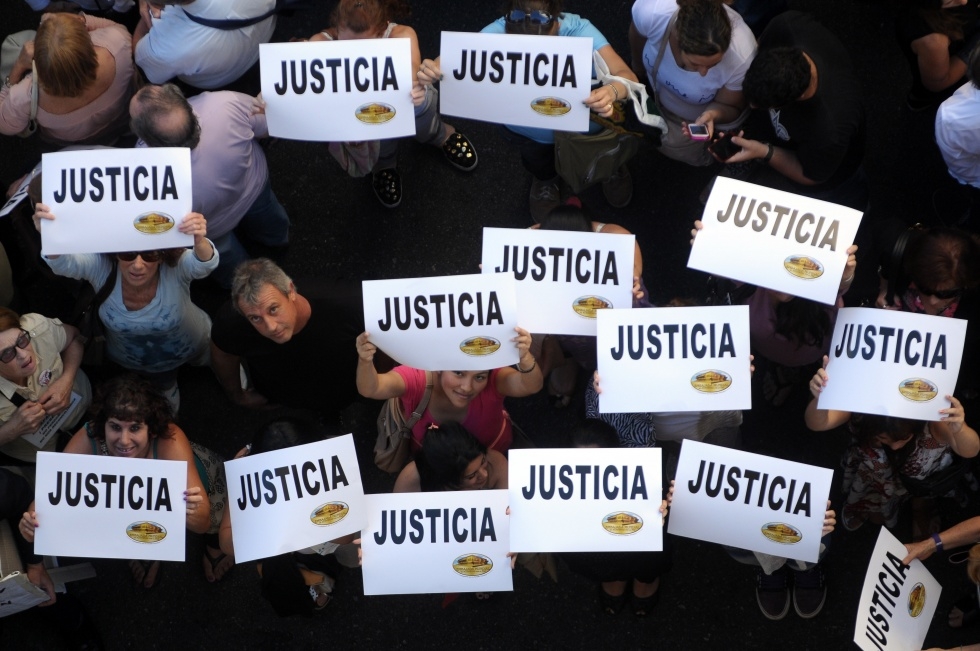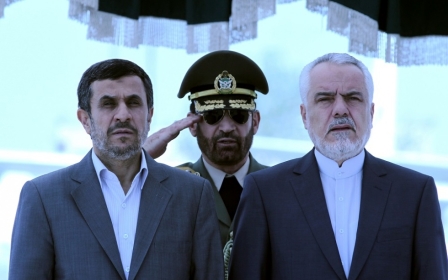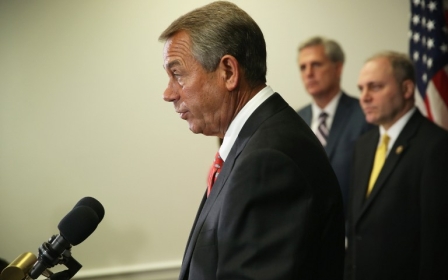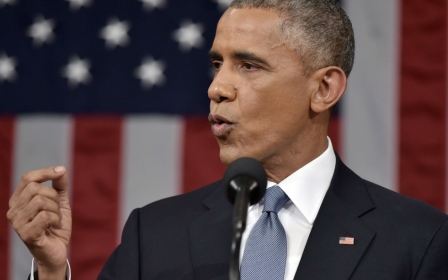Argentinian Jews protest after prosecutor in Iran-linked bombing found dead

Argentina's president ruled out suicide in the suspicious death of the prosecutor investigating the 1994 bombing in Buenos Aires as the Jewish community pressed for "truth and justice" in protests on Wednesday.
Alberto Nisman was found dead of a gunshot to the head in his home on Sunday, the day before he was to go before a congressional hearing to accuse President Cristina Kirchner of a cover-up to protect a group of Iranian suspects.
Investigators have said the prosecutor's death appeared to be a suicide, but no gunpowder residue was detected on his hands. Foul play, including an "induced suicide" or "homicide," has not been ruled out.
In an open letter to the country, President Cristina de Kirchner said Nisman had been falsely presented with witnesses claiming to be state intelligence agents. The president said: “They used him (Nisman) while he was alive and then they needed him dead.”
Earlier on Wednesday thousands of members of Argentina's Jewish community turned out to protest over Nisman's death.
"We will not allow another investigating prosecutor to die," Julio Schlosser, a leader of Argentina's Jewish community, which is Latin America's largest, told AFP.
He was among some 2,000 demonstrators in Buenos Aires' Once neighbourhood, who responded to calls for a demonstration demanding "truth and justice".
The affair has sent tensions in Argentina souring, especially after a judge released the 280-page complaint Nisman filed before his death, charging that Kirchner had issued an "express directive" to shield a group of Iranian suspects in the 1994 Jewish charities federation centre bombing.
Nisman contended that the government had agreed to swap grain for oil with Iran in exchange for withdrawing "red notices" to Interpol seeking the arrests of the former and current Iranian officials accused in the case.
"The plan arranged by Cristina Fernandez [de Kirchner] included the cessation of red notices to Interpol - a plan unexpectedly frustrated by the strong action of Interpol secretary general Ronald K Noble," the complaint said.
Noble, a former head of the international police agency, however, said Nisman's charge was "false" and that Argentine officials had never made a request to remove the red notices.
A top Kirchner aide, Anibal Fernandez, also slammed the complaint as “flimsy” saying that it “made no sense”.
More than 8o people were killed and more than 300 injured in the 1994 bomb blast that destroyed the Buenos Aires headquarters of the Argentine Jewish Mutual Association, or AMIA. It was Argentina's worst ever terror strike, although the subsequent investigation has been marred by accusations of corruption for years.
In 2004, all police officers linked to the case were found “not guilty” while a year later, the presiding judge, Juan Jose Galeano, was impeached due to serious irregularities with the case.
Since 2006, Argentine courts have demanded the extradition of eight Iranians, including former president Akbar Hashemi Rafsanjani, former defence minister Ahmad Vahidi and Mohsen Rabbani, Iran's former cultural attaché in Buenos Aires, in connection with the attack.
In 2013, Kirchner signed a memorandum of understanding with Tehran agreeing to set up a "truth commission" to investigate the bombing and allowing Argentine prosecutors to question the suspects in Iran.
The rapprochement was vehemently opposed at the time by Jewish community leaders, who charged it was "unconstitutional".
The years of legal wrangling have angered many Argentinian Jews who worry that Nisman’s death could once again see them denied "justice” with many protesters on Wednesday pointing to seeming inconsistencies with the alleged suicide.
These include the testimony of the locksmith who opened the back door to allow detectives access to Nisman’s apartment, who said that he gained access easily.
“It took me longer to pack up my things [tools] than to open the door,” he said. “If someone entered or not, I don’t know.”
Argentina’s official news agency, Telam, also said detectives were investigating another access point to the apartment, where an unidentified and recent footprint and fingerprint had been found.
Controversy is also growing about the absence of gunpowder on Nisman’s hands, which should have been there if he had personally discharged the gun. A second test has now been ordered by the authorities, although the results have yet to be announced.
The situation "requires the prosecutor to employ the greatest investigative force to rule out any hypothesis: suicide, induced suicide or homicide," said public safety chief Sergio Berni.
The prosecutor was found dead by his mother in the bathroom of his 13th floor apartment in Buenos Aires' upscale Puerto Madero neighbourhood. A .22-caliber revolver was found beside his body.
Investigators have questioned a colleague of Nisman, Diego Lagomarsino, who said he brought the prosecutor the handgun Saturday night at his request.
Nisman had been investigating the AMIA bombing since 2004, and recently had reported receiving death threats.
New MEE newsletter: Jerusalem Dispatch
Sign up to get the latest insights and analysis on Israel-Palestine, alongside Turkey Unpacked and other MEE newsletters
Middle East Eye delivers independent and unrivalled coverage and analysis of the Middle East, North Africa and beyond. To learn more about republishing this content and the associated fees, please fill out this form. More about MEE can be found here.




